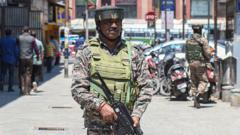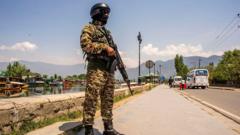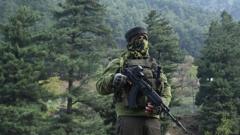Amid escalating hostilities, US Secretary of State Marco Rubio encourages both countries to prioritize peace and security in the region.
**US Calls for De-escalation Between India and Pakistan After Kashmir Attack**

**US Calls for De-escalation Between India and Pakistan After Kashmir Attack**
The US urges Indian and Pakistani cooperation to ease tensions following a militant attack that resulted in significant civilian casualties in Kashmir.
Following a recent militant attack in Indian-administered Kashmir that claimed the lives of 26 civilians, the United States is pressing India and Pakistan to work collaboratively to defuse rising tensions. Secretary of State Marco Rubio conducted separate discussions with India's Foreign Minister S. Jaishankar and Pakistan’s Prime Minister Shehbaz Sharif, urging both leaders to "maintain peace and security in South Asia."
India holds Pakistan responsible for supporting the militants behind the April 22 attack near Pahalgam but Islamabad firmly denies these allegations. In a series of retaliatory measures, India has closed its airspace to all Pakistani aircraft, further heightening the ongoing tit-for-tat scenarios that have characterized relations between the two countries.
Indian Foreign Minister S. Jaishankar emphasized the necessity for justice against the “perpetrators, backers, and planners” of the attack, a sentiment reiterated by Rubio who expressed condolences and reaffirmed US support for India’s efforts against terrorism. Conversely, during his discussions, Prime Minister Sharif dismissed any linkage to Pakistan, instead urging the US to convey to India the importance of de-escalating the situation.
As the conflict escalates, Pakistan's information minister raised alarms of possible imminent military action from India, prompting heightened vigilance in both nations. Prime Minister Modi has called critical meetings with military officials and reportedly granted the armed forces discretion over their response to the attack.
Recent events have included cross-border skirmishes and a suspension of visa agreements, with hundreds of Pakistani nationals departing India amid the heightened hostilities. Additionally, several Pakistani social media accounts have been removed from Indian platforms, interpreted as a further manifestation of the diplomatic fallout.
The Kashmir region has been a long-standing point of contention between India and Pakistan since their partition in 1947, with a history of insurgency and violence since 1989. Although India has not definitively named a responsible party for the attack, initial reports pointed towards the Resistance Front, which has since denied involvement. Indian police have reported identifying some suspects, suggesting a mix of Pakistani and local assailants.
In the wake of the incident, Prime Minister Modi has vowed to retaliate assertively against those behind the attack, asserting that India will seek justice in unprecedented ways. This situation reflects the broader volatility that characterizes the region, where each retaliatory measure exacerbates the already fraught dynamics between the two nuclear-armed neighbors.




















